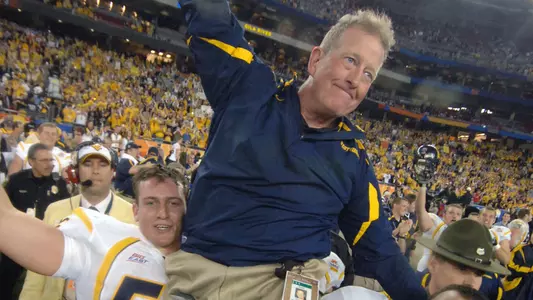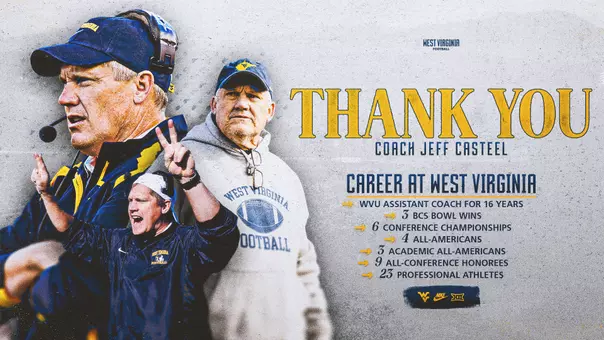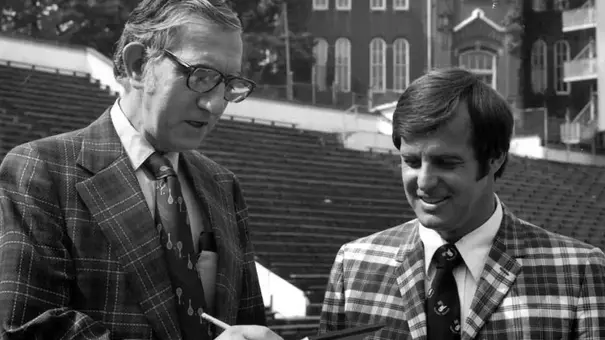
Remembering Bill Stewart 12 Years After His Untimely Passing
May 21, 2024 02:30 PM | Football, Blog
MORGANTOWN, W.Va. – Today was the day 12 years ago when Bill Stewart died suddenly of a heart attack at Stonewall Resort near Weston while playing in a golf foursome with former WVU athletic director Ed Pastilong.
I remember that day well, hanging out in our old offices down on the main floor of the WVU Coliseum on a lazy Friday, when that phone call from MetroNews' Hoppy Kercheval seeking confirmation of Stewart's death blasted in like an air horn.
Of course, Hoppy knew far more than anyone in the office did at the time, so no confirmation was immediately forthcoming.
Stewart died less than a year after a negotiated buyout when it became clear that the coach-in-waiting arrangement that was made for Dana Holgorsen was not going to work.
I sometimes think about Stewart's three full seasons coaching the Mountaineers and that one magical night in Arizona when his underdog football team "left no doubt" against the Oklahoma Sooners.
I also remember Stewart's distinctive laugh and his knack for being able to remember the smallest of details. Once, when I told him my wife, a native Long Islander, has been to both Brooklyns – the one in New York and the other just south of downtown New Martinsville, our hometowns, Stewart nearly doubled over in laughter.
When it was becoming clear that West Virginia was going to pull off its stunning upset victory over third-ranked Oklahoma, matching the highest-ranked opponent the Mountaineers have ever defeated, I remember the vibe in the press box that night was that Stewart was about to have the interim tag removed from his title.
Skip Holtz was one of the names on the list of coaches to be interviewed, but the way Stewart handled himself in such a difficult situation made a big impression on the decision makers at the time. A deal for Stewart to coach the football team was struck sometime that evening in his hotel room at the team headquarters in Scottsdale, Arizona, and a press conference was hastily arranged in the ballroom the following morning before the team's flight back to Pittsburgh.
Stewart's record during his three full seasons at West Virginia from 2008 to 2010, including the Fiesta Bowl win in 2008, was 28-12, meaning he won 70% of his football games while at West Virginia.
Do you know how many other coaches have won at least 70% of their football games at West Virginia University? The answer is one: Clarence Spears, who captured 80.8% of his 39 games here from 1921 to 1924.
That's it!
For those in West Virginia who educated me on Mountaineer football history – people such as Mickey Furfari, Tony Constantine, Dick Hudson, Shorty Hardman, Eddie Barrett, et al – no other coach comes close to approaching what Spears did at WVU during the 1922, 1923 and 1924 seasons.
Mont McIntire, who coached before Spears, raised people's hopes with great victories at Navy and Princeton, but he struggled against rivals Pitt and Washington & Jefferson, so he was cast aside. McIntire, ironically also from New Martinsville, won nearly 67% of his football games at West Virginia.
The legendary Rat Rodgers, who came after Spears, won eight of the nine games he coached in 1925 from the players Spears had left, and had another outstanding season in 1928, but that was all unforgiving Mountaineer fans could take before he was discarded for Greasy Neale.
Things only got worse under Neale, and it would take coaching the Philadelphia Eagles to a pro football championship in 1948 before WVU fans eventually reevaluated Greasy's coaching acumen.
Bobby Bowden was hung in effigy in Woodburn Circle one year at WVU, and it wasn't until he led Florida State to national championships in 1993 and 1999 when many of his West Virginia detractors grudgingly gave him his due.
Do you see a pattern forming here?
Stewart's supporters think immediately of the Fiesta Bowl, the Meineke Car Care Bowl win over North Carolina, the Auburn triumph, and those consecutive wins over Pitt in 2009 and 2010.
His detractors point to the back-to-back losses to East Carolina and Colorado during his first season in 2008, a controversial goal-line replay that led to a 24-21 defeat at fifth-ranked Cincinnati in 2009, the fingernail-biting overtime triumph at Marshall and the overtime loss at Connecticut when fullback Ryan Clarke fumbled on his first-down carry at the goal line in overtime.
After the UConn defeat, when Stewart's fate was essentially sealed, his team rattled off victories against Cincinnati (37-10), Louisville (17-10), Pitt (35-10) and Rutgers (35-14) to conclude the regular season.
Yes, there were no superpowers in the Big East during Stewart's three-season tenure at WVU, but there were also not any really bad programs either – mostly 50-50 games against teams with similar records. In fact, the only bad team West Virginia played during Stewart's time here was 2-11 UNLV, which the Mountaineers soundly defeated 49-10 in 2010.
But, of course, history loses all of this.
People only remember what they want to remember and forget all the other stuff. It sort of goes this way in politics, too, but I digress.
Dud DeGroot, who won nine games and a Sun Bowl one year before losing to Ohio U. in Athens the next, once had this to say about yesterday's football experts.
"A person must coach professional football and then come to West Virginia to get a real education. In all my years of coaching, I have never known so many wise guys who know all the answers as I have met in West Virginia."
There you have it!
When Bill Stewart died on May 21, 2012, I thought then that history would judge him much differently than his contemporaries.
Twelve years later, my opinion has not changed.
Time has a way of healing all wounds, or "wounding all heels," as John Lennon used to say.
I remember that day well, hanging out in our old offices down on the main floor of the WVU Coliseum on a lazy Friday, when that phone call from MetroNews' Hoppy Kercheval seeking confirmation of Stewart's death blasted in like an air horn.
Of course, Hoppy knew far more than anyone in the office did at the time, so no confirmation was immediately forthcoming.
Stewart died less than a year after a negotiated buyout when it became clear that the coach-in-waiting arrangement that was made for Dana Holgorsen was not going to work.
I sometimes think about Stewart's three full seasons coaching the Mountaineers and that one magical night in Arizona when his underdog football team "left no doubt" against the Oklahoma Sooners.
I also remember Stewart's distinctive laugh and his knack for being able to remember the smallest of details. Once, when I told him my wife, a native Long Islander, has been to both Brooklyns – the one in New York and the other just south of downtown New Martinsville, our hometowns, Stewart nearly doubled over in laughter.
When it was becoming clear that West Virginia was going to pull off its stunning upset victory over third-ranked Oklahoma, matching the highest-ranked opponent the Mountaineers have ever defeated, I remember the vibe in the press box that night was that Stewart was about to have the interim tag removed from his title.
Skip Holtz was one of the names on the list of coaches to be interviewed, but the way Stewart handled himself in such a difficult situation made a big impression on the decision makers at the time. A deal for Stewart to coach the football team was struck sometime that evening in his hotel room at the team headquarters in Scottsdale, Arizona, and a press conference was hastily arranged in the ballroom the following morning before the team's flight back to Pittsburgh.
Stewart's record during his three full seasons at West Virginia from 2008 to 2010, including the Fiesta Bowl win in 2008, was 28-12, meaning he won 70% of his football games while at West Virginia.
Do you know how many other coaches have won at least 70% of their football games at West Virginia University? The answer is one: Clarence Spears, who captured 80.8% of his 39 games here from 1921 to 1924.
That's it!
For those in West Virginia who educated me on Mountaineer football history – people such as Mickey Furfari, Tony Constantine, Dick Hudson, Shorty Hardman, Eddie Barrett, et al – no other coach comes close to approaching what Spears did at WVU during the 1922, 1923 and 1924 seasons.
Mont McIntire, who coached before Spears, raised people's hopes with great victories at Navy and Princeton, but he struggled against rivals Pitt and Washington & Jefferson, so he was cast aside. McIntire, ironically also from New Martinsville, won nearly 67% of his football games at West Virginia.
The legendary Rat Rodgers, who came after Spears, won eight of the nine games he coached in 1925 from the players Spears had left, and had another outstanding season in 1928, but that was all unforgiving Mountaineer fans could take before he was discarded for Greasy Neale.
Things only got worse under Neale, and it would take coaching the Philadelphia Eagles to a pro football championship in 1948 before WVU fans eventually reevaluated Greasy's coaching acumen.
Bobby Bowden was hung in effigy in Woodburn Circle one year at WVU, and it wasn't until he led Florida State to national championships in 1993 and 1999 when many of his West Virginia detractors grudgingly gave him his due.
Do you see a pattern forming here?
Stewart's supporters think immediately of the Fiesta Bowl, the Meineke Car Care Bowl win over North Carolina, the Auburn triumph, and those consecutive wins over Pitt in 2009 and 2010.
His detractors point to the back-to-back losses to East Carolina and Colorado during his first season in 2008, a controversial goal-line replay that led to a 24-21 defeat at fifth-ranked Cincinnati in 2009, the fingernail-biting overtime triumph at Marshall and the overtime loss at Connecticut when fullback Ryan Clarke fumbled on his first-down carry at the goal line in overtime.
After the UConn defeat, when Stewart's fate was essentially sealed, his team rattled off victories against Cincinnati (37-10), Louisville (17-10), Pitt (35-10) and Rutgers (35-14) to conclude the regular season.
Yes, there were no superpowers in the Big East during Stewart's three-season tenure at WVU, but there were also not any really bad programs either – mostly 50-50 games against teams with similar records. In fact, the only bad team West Virginia played during Stewart's time here was 2-11 UNLV, which the Mountaineers soundly defeated 49-10 in 2010.
But, of course, history loses all of this.
People only remember what they want to remember and forget all the other stuff. It sort of goes this way in politics, too, but I digress.
Dud DeGroot, who won nine games and a Sun Bowl one year before losing to Ohio U. in Athens the next, once had this to say about yesterday's football experts.
"A person must coach professional football and then come to West Virginia to get a real education. In all my years of coaching, I have never known so many wise guys who know all the answers as I have met in West Virginia."
There you have it!
When Bill Stewart died on May 21, 2012, I thought then that history would judge him much differently than his contemporaries.
Twelve years later, my opinion has not changed.
Time has a way of healing all wounds, or "wounding all heels," as John Lennon used to say.
Mark Kellogg,Jordan Harrison & Meme Wheeler | Baylor
Sunday, February 01
Ross Hodge | Baylor Postgame
Sunday, February 01
Treysen Eaglestaff & Brenen Lorient | Baylor Postgame
Sunday, February 01
SWIM: Senior Day Recap
Saturday, January 31















